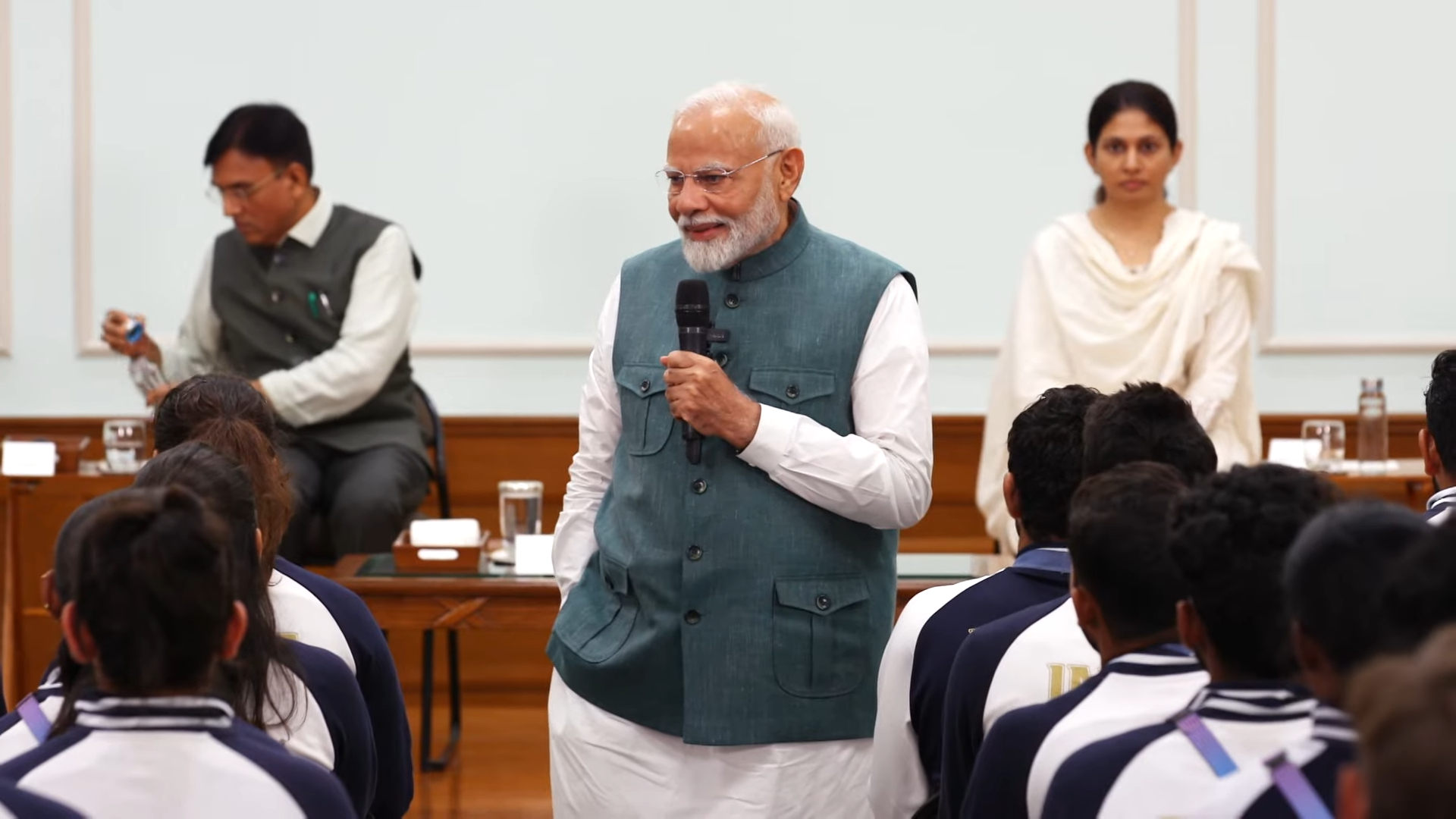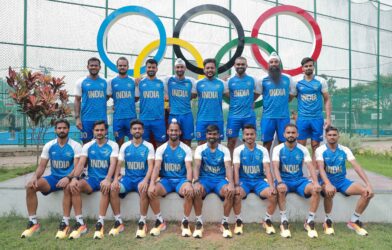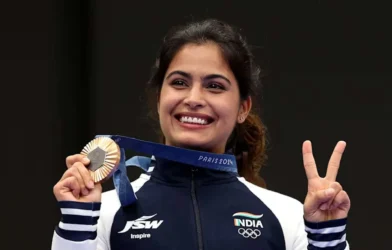On August 15, 2024, during India’s Independence Day celebrations, Prime Minister Narendra Modi hosted the Olympics Indian Contingent of athletes who represented the nation at the Paris Olympics. The interaction was not just a formal felicitation but a heartfelt conversation between the leader of the country and the sporting heroes who carry the hopes and dreams of over 1.4 billion people. This gathering exemplified the relationship between sports, national pride, and the broader aspirations for India’s future.
A Day of Celebration, Acknowledgment, and Reflection for Olympics Indian Contingent
Prime Minister Modi’s meeting with the Olympics Indian Contingent was filled with moments of pride, encouragement, and recognition of their efforts. Despite not achieving a record-breaking medal haul, the Indian contingent performed admirably at the Paris Olympics, bringing home six medals—three bronze, two silver, and a historic gold (Kashmir Life) (NewsBytes). This was a commendable achievement and tied for India’s second-best performance at any Olympic Games, matching the success of the London 2012 Olympics.
Neeraj Chopra, India’s javelin sensation, made headlines once again by clinching a silver medal, becoming the first Indian to win two Olympic medals in track and field (Kashmir Life) (NewsBytes). Meanwhile, Manu Bhaker became the first Indian female shooter to win an Olympic medal post-independence, setting a new benchmark for Indian sportswomen (DNA India). The Indian men’s hockey team continued their legacy with another medal win, building upon their bronze from the Tokyo Olympics.
The conversation between Modi and the athletes reflected the PM’s deep understanding of their journeys. He reminded them that their efforts were not just about winning medals but about setting new standards for future athletes. “You have raised the tricolor high,” he told them, “and for that alone, every Indian is proud of you” (Republic World). He emphasized that every competition brings lessons, and every experience is valuable for shaping future successes (DNA India).
A Leader’s Message to Olympics Indian Contingent : Sports as a Microcosm of National Growth
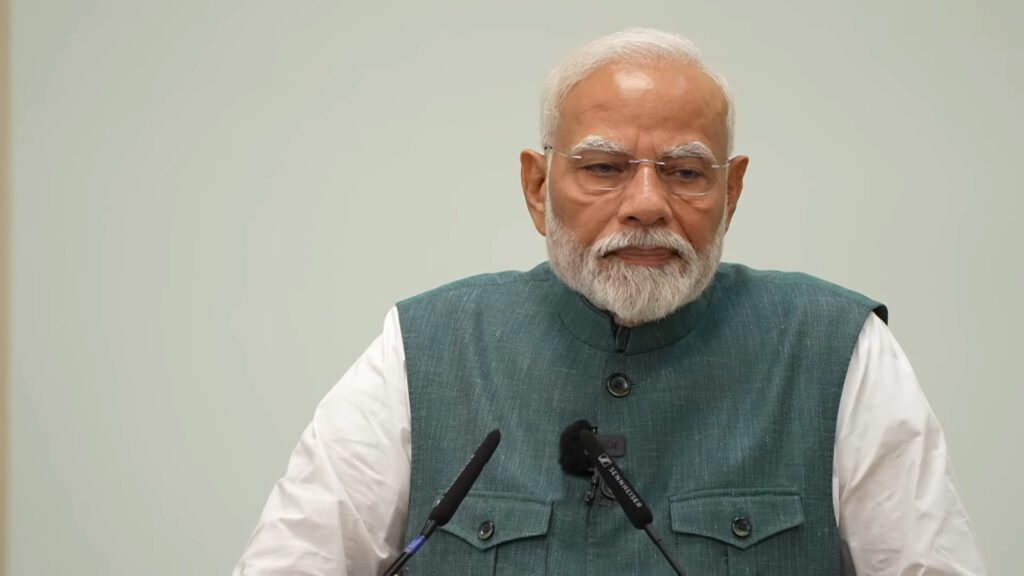

Modi’s interaction with the Olympics Indian Contingent was a mix of encouragement and wisdom, a reflection of his long-standing interest in sports as a tool for nation-building. “Sports teach us humility, patience, and how to stay grounded even in victory,” he remarked during the session (NewsBytes). The Prime Minister also pointed out that even in moments of defeat, there is no real loss in sports—only learning experiences. This positive framing was particularly impactful for athletes like Aman Sehrawat and Manu Bhaker, who narrowly missed higher podium finishes but were still celebrated for their resilience and potential (Republic World).
Modi’s words resonated with the athletes, many of whom spoke of the importance of his support in their journey. Shuttler Lakshya Sen, who reached the semifinals, shared that PM Modi’s constant encouragement and personal calls after major matches helped boost the morale of the athletes (DNA India). This support is a cornerstone of Modi’s approach to sports: recognizing individual effort while also building a collective spirit among the country’s athletes.
Moreover, the Prime Minister emphasized the role of sports in creating a healthier and more disciplined society. He reiterated the importance of developing a world-class sports ecosystem in India, a project that has been underway through initiatives like Khelo India and Target Olympic Podium Scheme (TOPS) (DNA India). These efforts aim to identify talent from every corner of the country, provide them with necessary resources, and help them achieve their fullest potential.
The Future of Indian Sports: The 2036 Olympics Vision
One of the most ambitious statements made by Modi during this event was his reiteration of India’s desire to host the 2036 Olympics (Kashmir Life) (DNA India). This dream, according to him, is not just about showcasing India on the global stage but about ensuring that the country’s sports infrastructure evolves to match global standards. “We are building an ecosystem that will allow us not only to excel in sports but to become a global leader,” he said (Republic World). Hosting the Olympics, Modi noted, would be a natural next step for a nation that is increasingly becoming a hub for international events, including the G20 Summit (DNA India).
This vision for the future aligns with Modi’s broader political narrative of a ‘Viksit Bharat’ (Developed India) by 2047. The Prime Minister believes that as India strengthens its position on the global economic stage, its prowess in sports must also rise. For athletes like Lovlina Borgohain and Mirabai Chanu, who were part of this interaction, the opportunity to contribute to this grand vision is both a challenge and a privilege (NewsBytes) (DNA India).
The Heart of the Matter: Personal Stories of Triumph and Resilience
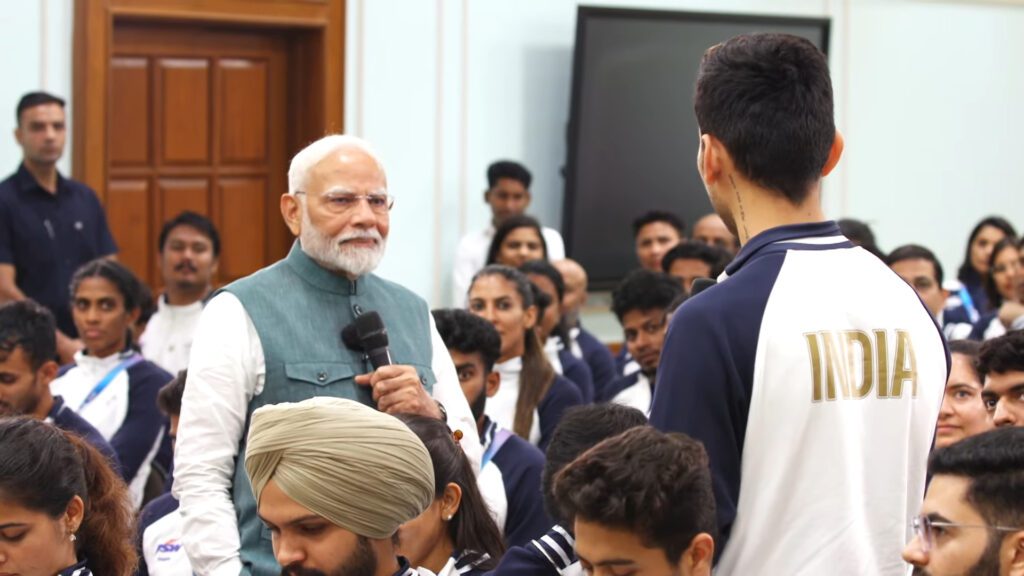

One of the most touching aspects of the interaction was the personal stories shared by the athletes. Each athlete’s journey is a story of perseverance, sacrifice, and overcoming adversity—stories that echo the larger narrative of India’s growth and aspirations.
For instance, Aman Sehrawat, a bronze medalist in wrestling, spoke about how he drew strength from his personal struggles to compete at the highest level. PM Modi, in turn, highlighted how athletes like Aman represent the true spirit of India—unwavering determination in the face of obstacles (NewsBytes) (DNA India). These stories not only inspire the next generation of athletes but also embody the values that India seeks to promote on the global stage.
Similarly, Manu Bhaker’s rise as a shooting star in the Olympics reflects the changing landscape of Indian sports, where young talent is nurtured and celebrated. Bhaker’s achievement, Modi remarked, is a testament to the progress Indian women are making in traditionally male-dominated fields, particularly in sports (NewsBytes) (DNA India). Her two bronze medals symbolize both personal and national milestones.
Building a Sports Culture
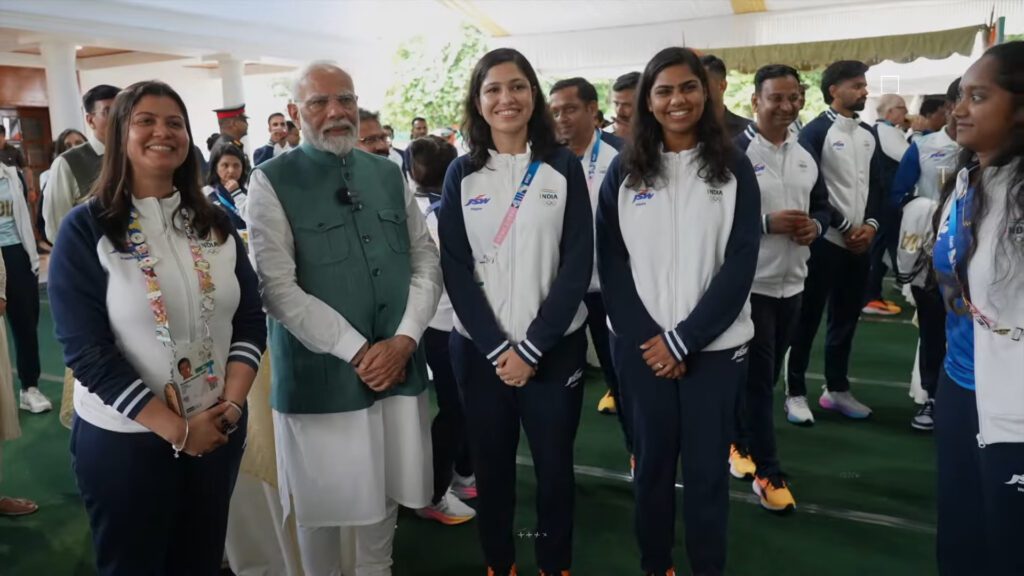

Towards the end of the interaction, PM Modi issued a call to action for the athletes. He urged them to engage with young Indians, especially those from rural backgrounds, to inspire them to take up sports. Modi’s vision of a robust sports culture is one where every village and town in India nurtures future Olympians (Republic World). He asked the athletes to become ambassadors of fitness and discipline, helping to spread the message of ‘Vocal for Local’ in sports, where local talent is nurtured to reach global heights (DNA India).
His message was clear: India’s journey towards becoming a sporting superpower is just beginning. With the support of its athletes, India can not only win medals but also foster a national culture that values physical health, discipline, and international competitiveness (Kashmir Life).
Conclusion
The 2024 Independence Day celebration, marked by the interaction between PM Modi and the Indian Olympic contingent, was more than a ceremonial gathering. It was a powerful statement about the role of sports in shaping national identity and progress. Modi’s words reflected his deep belief in the potential of sports to uplift individuals and the country as a whole. As India looks towards future Olympics, particularly with the goal of hosting the 2036 Games, the foundation laid by athletes like Neeraj Chopra, Manu Bhaker, and Aman Sehrawat will serve as the cornerstone of India’s sporting legacy.
This meeting was not just a celebration of past achievements but a clarion call for future victories—both on the field and off. With a growing sports infrastructure, government support, and the indomitable spirit of its athletes, India is well on its way to becoming a global sports powerhouse. As Modi said, the youth of India are ready to leap forward, and in this golden era, their success will fuel the nation’s journey towards a brighter future (Kashmir Life) (NewsBytes) (DNA India).


